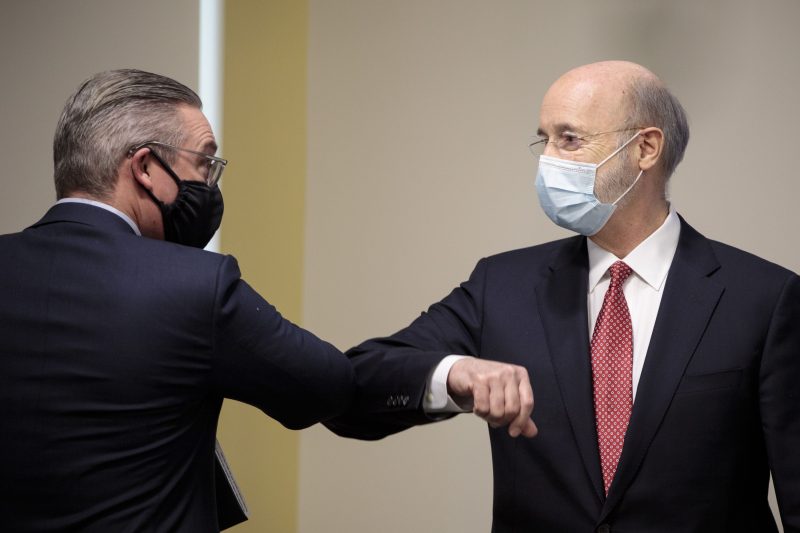The Republican Philadelphia city commissioner famously stood up to former President Donald Trump’s claims of election fraud in 2020 while receiving death threats
Carter Walker of Votebeat
This article is made possible through Spotlight PA’s collaboration with Votebeat, a nonpartisan news organization covering local election administration and voting. This article is available for reprint under the terms of Votebeat’s republishing policy.
Al Schmidt, a Republican who famously stood up to former President Donald Trump’s claims of election fraud in 2020 while receiving death threats, has been nominated to be Pennsylvania’s top election official.
Gov.-elect Josh Shapiro, a Democrat, said in a news release that he selected Schmidt to lead the Pennsylvania Department of State because he was “an integral part of the effort to protect our democracy and stop Pennsylvanians’ votes from being thrown out” after the 2020 election. Schmidt served as a city commissioner overseeing elections in Philadelphia for 10 years.
“Al Schmidt has a proven track record of defending our democracy, protecting voting rights, and standing up to extremism — even in the face of grave threats — and I am proud to nominate him to be Pennsylvania’s next Secretary of the Commonwealth,” Shapiro said in the news release.
In an interview late Wednesday with Votebeat and Spotlight PA, Schmidt said his priorities included improving voter registration processes as well as the way votes are cast and counted, positions that align with those Shapiro outlined on the campaign trail.
Schmidt also stressed the need to push back on election misinformation, something he highlighted in response to a question about how the Department of State could support local electionsdirectors, who have been leaving the job in droves.
“A great benefit will be that I’ve run elections on the ground for the past 20 years, really knowing what counties need to be successful,” he said. “A component of that, and something I really valued, was monitoring election lies seeking to undermine confidence in the results in Philly, which were broadcast well in advance. It is important not to ignore those lies because they cause harm.”
The selection marks Shapiro’s first cabinet-level appointment, fulfilling a campaign promise, and is an unusual nomination across the partisan divide. Schmidt must still be confirmed by the state Senate.
The events around the 2020 election boosted Schmidt’s profile from that of a local election official to that of a trusted national voice on voting administration and misinformation.
Philadelphia’s election was under heavy scrutiny in 2020 as workers counted an unprecedented number of mail ballots, a task that spanned days. Conspiracy theories about the integrity of the election and the process in Philadelphia were running rampant on social media, and Schmidt began giving national media interviews debunking them.
For example, speaking to CNN, Schmidt pushed back about claims of dead people voting. Asked about other claims from Trump, he said, “I think people should be mindful that there are bad actors who are lying to them.”
Shortly after that interview, Trump tweeted that Schmidt, who he referred to as a Republican-in-name-only, was “being used big time by the Fake News Media” and was refusing to look at Trump’s claims of election fraud.
If there had been fraud, Schmidt said Philadelphia officials would have looked into it and referred it to law enforcement, as he had personally done in the past.
Schmidt’s stance led to a backlash from Trump and his allies, and no Republican officials in the state came to his defense.

Schmidt’s policy priorities
Schmidt said he intends to push for process improvements, specifically mentioning the need for more time to pre-canvass mail ballots, something he said he’s heard near-universal agreement on.
“It’s a problem and everyone knows it’s a problem, and it’s something other states have been able to solve easily by allowing pre-canvassing before Election Day,” he said.
He said the lack of pre-canvassing forces delays in reporting election results, leaving a vulnerability bad actors can exploit.
At the beginning of 2022, Schmidt resigned from his role as commissioner and became president of the Committee of Seventy, a Philadelphia-based good-government group that has historically advocated for election reforms.
Over the summer, Schmidt was also one of the witnesses offering live testimony to a U.S. House committee investigating the Jan. 6 attack on the Capitol.
He told the committee that after Trump’s tweet, he received much more “specific” and “graphic” threats directed at him and at his family.
One such threat came in the form of an email to his wife, according to the New York Times, which read “HEADS ON SPIKES. TREASONOUS SCHMIDTS” and included a photo of the exterior of their house.
After 2020, Schmidt continued to speak out against his fellow Republicans when he believed they were pursuing poor election policy, such as the state Senate’s attempt to review the 2020 election.
“The Senate is labeling this undertaking a ‘full forensic investigation,’ an ‘election integrity’ review, and — perhaps most absurdly — an ‘audit,’” read an op-ed he co-authored. “These terms might sound official, but in reality, they only serve to hide the dangerous nature of the Senate’s actions.”
He also advocated for changes through editorials written with the current Acting Secretary of the Commonwealth Leigh Chapman and in testimony to U.S. Senate’s Rules Committee about the threats faced by election administrators.
While most governors fill their cabinets with members of their own party, it’s not unheard of for them to make cross-party nominations, said G. Terry Madonna, senior fellow in residence for political affairs at Millersville University. He noted Shapiro’s transition team includes several Republicans.
Election administration became one of the top issues during the 2022 gubernatorial campaign.
Shapiro’s opponent, state Sen. Doug Mastriano (R., Franklin), repeatedly emphasized in interviews the governor’s power to pick the state’s top election official. Shapiro highlighted Mastriano’s support of Trump’s 2020 fraud claims and amplified widespread speculation that Mastriano was planning to appoint Toni Shuppe, an election conspiracy theorist who leads Audit the Vote PA, as secretary.
Schmidt, 51, is originally from Pittsburgh and graduated from Allegheny College in 1993 with a B.A. in history.
After obtaining a doctorate in history from Brandeis University in 2000, he worked for five years as a senior analyst at the U.S. Government Accountability Office before coming to Philadelphia to serve as the executive director of the city’s Republican committee and then as an adviser to the state Republican Party.
He ran unsuccessfully for city controller in 2009, then won an election to become a Philadelphia city commissioner in 2011, spending the next 10 years helping to oversee elections in the state’s largest municipality.
“Al Schmidt is someone I worked side by side with for over a decade,” Seth Bluestein, Schmidt’s former deputy who then succeeded him as city commissioner, said in an interview with Votebeat and Spotlight PA. “His professionalism and integrity are unmatched, and I am confident he will be an excellent secretary of state.”
Carter Walker is a reporter for Votebeat in partnership with Spotlight PA. Contact Carter at cwalker@votebeat.org.
WHILE YOU’RE HERE… If you learned something from this story, pay it forward and become a member of Spotlight PA so someone else can in the future at spotlightpa.org/donate. Spotlight PA is funded by foundationsand readers like you who are committed to accountability journalism that gets results.



